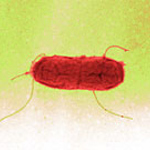NRL for Salmonella

The main task of the NRL for Salmonella is the identification and analysis of Salmonella isolates originating from feed, food and primary production, using serological and molecular biological methods. For conducting investigations of outbreaks and epidemiological studies, a variety molecular biological methods have been established. Within the World Organization for Animal Health, the NRL Salmonella is designated an OIE-reference laboratory.
Main areas of the NRL for Salmonella
- Serotyping of Salmonella according to the White-Kauffmann-Le Minor scheme
- Epidemiological surveys on the prevalence of Salmonella serotypes
- Taking part in the implementation of national (General Administrative Provision, AVV) and European monitoring programs
- Taking part in the national control programs for Salmonella (Directive 2003/99/EC and Regulation (EC) No 2160/2003) in breeding flocks of Gallus gallus (Commission Regulation (EU) No 200/2010), in laying hens of Gallus gallus (Commission regulation (EU) No 517/2011), in flocks of broilers (Commission regulation (EU) No 200/2012) and in flocks of turkeys (Commission regulation (EU) No 1190/2012)
- Conducting inter-laboratory studies and participation in ring trials/proficiency tests within the national control program for Salmonella
- Participation in investigations of chains of infection and foodborne outbreaks, e.g. by applying high-resolution techniques (e.g. whole genome sequencing)
- Identification of vaccine strains
- Rapid detection of Salmonella using PCR methods
- Molecular biological high resolution typing of Salmonella
- Participation in national and international research projects
- Providing advice and support to various institutions
- Management and maintenance of strain collections
- Participation in national and international committees
- Advising on and preparing scientific opinion statements
- Collaboration with the European Union Reference Laboratory for Salmonella
- Development and validation of methods
